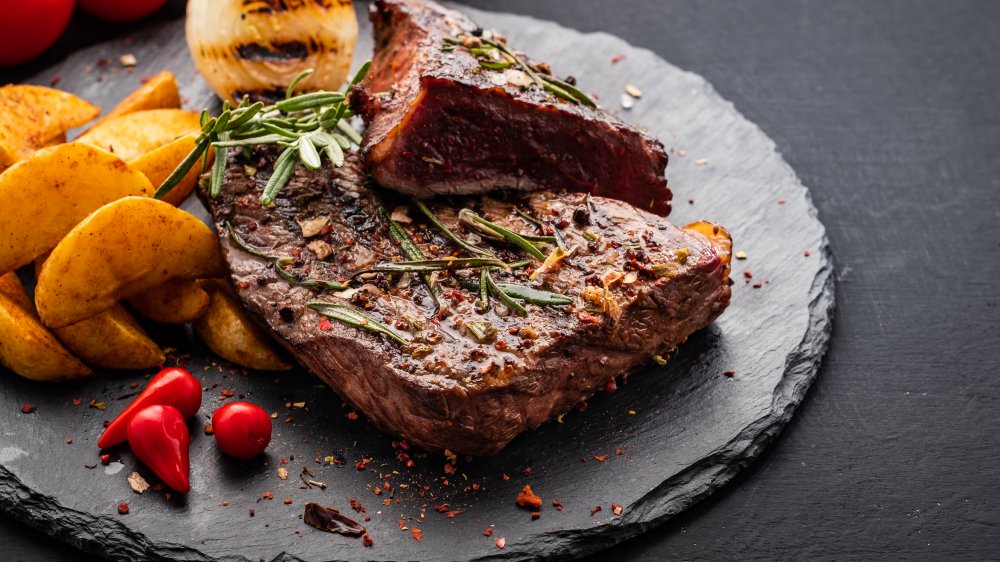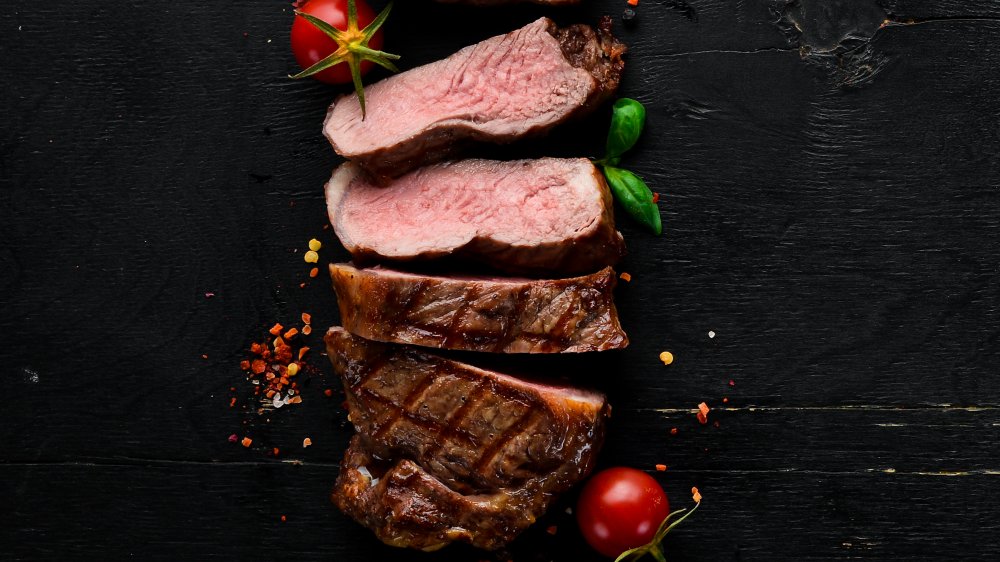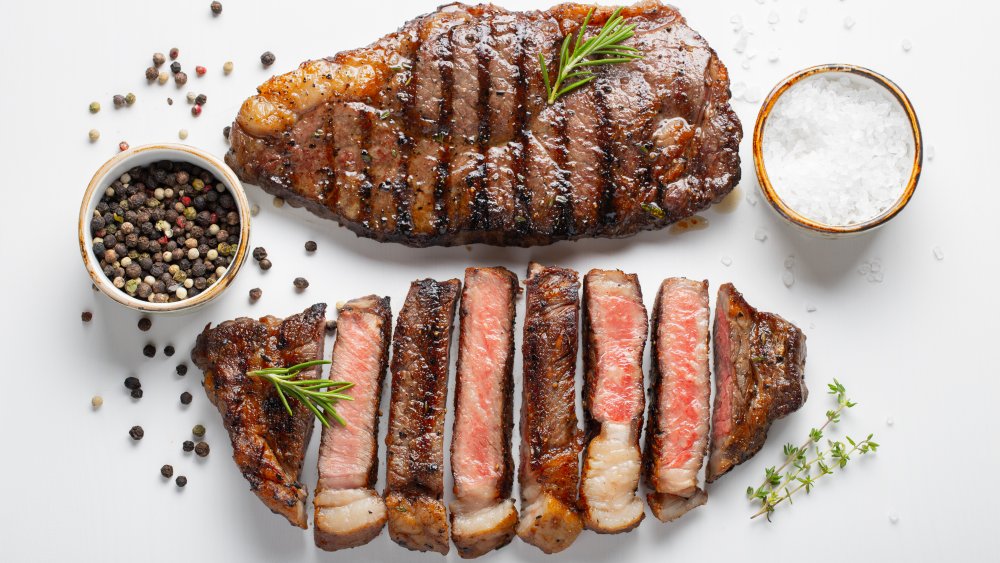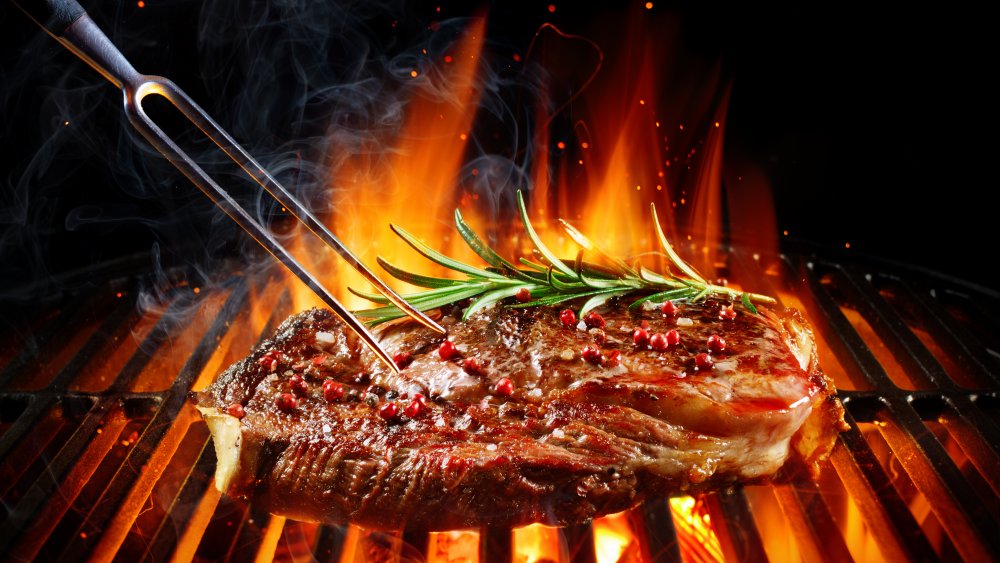When You Eat Red Meat Every Day, This Is What Happens To Your Body
There are few things as controversial as choosing to eat red meat every day. Whether it's a juicy burger, a nice steak, or even a delicious taco, red meat is something that people tend to either love or hate. There are people who say red meat is terrible for you, and there are others who claim that's it's full of essential vitamins and nutrients. Whatever red meat camp you belong to, though, it's no secret that the protein source has both pros and cons.
But what would happen if you ate red meat every day? How would your body react to a lot of red meat? Would the amount you consume make a difference? Well, there's a lot of research out there on the side effects of eating red meat, and it's all pretty complicated. However, it's still important to take to heart the possibilities of what red meat can do to you because it may make a big impact on your health.
If you eat red meat every day, you'll consume a lot of nutrients
Though red meat tends to get a bad reputation among health-conscious people, it isn't all bad for you. In fact, red meat has a lot of nutrients in it, so, if you eat red meat every day, you'll be providing your body with great nutrition. According to Healthline, red meat is rich in a number of vitamins, helping you meet your recommended daily allowance. For instance, 3.5 ounces of ground red meat that boasts 10 percent fat can help you meet 25 percent of your B3 needs, 18 percent of the RDA for B6, and 37 percent of the RDA for B12 — and that's not to mention the selenium and zinc red meat provides!
Additionally, Healthline reported that "red meat is also rich in important nutrients like creatine and carnosine," and people who don't eat meat may be low in these. Creatine and carnosine impact your brain and muscular functions, so they're definitely important for overall health.
When you eat processed red meat every day, you could be consuming cancer-causing chemicals
Not all red meat is created equal. That's certainly true when it comes to processed red meat because it's almost in a completely different category than other red meats. As Healthline reported, a lot of today's meat products are "highly processed." These meats may be "smoked, cured, then treated with nitrates, preservatives and various chemicals."
Additionally, the World Health Organization has classified processed meat as "Group 1, carcinogenic to humans." According to the World Health Organization, this is because "carcinogenic chemicals that form during meat processing include N-nitroso compounds and polycyclic aromatic hydrocarbons. ... Some of these chemicals are known or suspected carcinogens." Because of that, the organization recommends decreasing the amount of processed red meat you consume, but that doesn't mean you have to stop eating it altogether — just be mindful of your portions.
If you eat red meat every day, your gut health may suffer
One of the most crucial pieces of the puzzle that is your health is your gut, and gut health is especially important for a high-functioning immune system. According to Healthline, the microorganisms in your gut are essential to a healthy body. And as it turns out, if you eat red meat every day, you won't be doing your gut health any favors.
According to family physician Dr. Joel Fuhrman, red meat isn't good for your gut health. "When you eat red meat, you are unnecessarily exposing your body to carcinogens, your blood flow is being compromised, oxidative stress and inflammatory markers are rising, and you are eating a food that provides no sustenance for your microbiome," Fuhrman told HuffPost. While that isn't to say that red meat hurts your gut health, it certainly doesn't help your gut health, particularly when compared to high-fiber or fermented foods. If you eat red meat every day, be sure you're also consuming plenty of gut-healthy foods and consider taking probiotics.
If you eat grass-fed beef every day, you'll receive high-quality vitamins your body needs
In addition to the health benefits that red meat in general has, one particular kind of red meat has even more nutrients: grass-fed beef. That isn't to say that you should only eat grass-fed beef and no other lean proteins, but there is something to be said about how grass-fed beef has a different makeup than regular red meat or processed red meat. According to Mayo Clinic, grass-fed beef tends to have "less total fat" and "more heart-healthy omega-3 fatty acids," along with conjugated linoleic acid, which may lower your risk for heart disease and cancer. Additionally, grass-fed beef has a lot more vitamin E.
When it comes to red meat, grass-fed beef tends to be the healthiest, as some studies have suggested. So, if you have the option to choose grass-fed beef over regular red meat, the grass-fed option would definitely be a healthier choice.
When you eat red meat every day, it can lead to heart disease
The best way to go about most foods is to keep in mind that moderation is key. Following a strict elimination diet where you can't have sugar, dairy, gluten, meat, or whatever else usually isn't sustainable. Red meat fine is in moderation, but, if you eat red meat every day, it could lead to heart disease. Although, the research behind that claim isn't black and white.
One 2016 study from the School of Public Health at China's Shandong University that was published in Public Health Nutrition reported that "higher consumption of total red meat and processed meat is associated with an increased risk of total, cardiovascular and cancer mortality." However, it's important to note that there's a difference between red meat in general and processed red meat. According to Healthline, though red meat in general is linked to an increased risk of heart disease, eating processed red meat appears to have an even harsher effect on your body. Watching how much red meat you eat can help keep you aware of your risk, so be sure to be mindful.
If you eat red meat every day, you might be at an increased risk for colorectal cancer
Red meat's potential to lead to cancer has been a huge topic in the health industry (via The New York Times), and while there is credible evidence that eating red meat every day could lead to cancer, it's a certain kind of cancer that consuming a lot of red meat can put you at risk for.
Specifically, Healthline reported, "The main type of cancer that red meat is believed to cause is colorectal cancer, the fourth most commonly diagnosed cancer in the world." One 2017 study from the Department of Epidemiology and Preventive Medicine at Gifu University Graduate School of Medicine concluded that a "higher intake of processed meat was associated with a higher risk of colon cancer in men."
So, there is evidence that red meat can lead to colorectal cancer, but there are also a lot of variables at play. That includes how the meat is cooked, which could mean the results of the Gifu University study, which was published in Cancer Science, aren't completely accurate. Still, if you eat red meat every day, it's probably safe to say you're likely at a greater risk of developing colorectal cancer than someone who doesn't.
You're more likely to be diagnosed with diabetes if you eat red meat every day
According to the American Diabetes Association, more than 34 million people in the United States had diabetes in 2018. And diabetes can be a debilitating and deadly disease. So, the fact that red meat might contribute to diabetes should have you thinking twice before picking up that ribeye from the butcher.
In fact, a 2010 study from the Department of Epidemiology at Harvard School of Public Health found that the "consumption of processed meats, but not red meats, is associated with higher incidence of CHD and diabetes mellitus." Another study — this one from Duke-NUS Medical School in 2017 — reported that a "higher intake of red meat and poultry is associated with significantly increased risk of developing diabetes, which is partially attributed to their higher content of heme iron in these meats."
Diabetes can be fatal, and keeping yourself healthy is one way to prevent the disease. For many, that may mean making the decision to not eat red meat every single day.
Your body will receive plenty of iron if you eat red meat every day
Obviously red meat has plenty of beneficial nutrients. And on top of all the protein and vitamins in it, red meat is also a great source of iron, which is critical for a healthy body and is something of which most adults aren't getting enough.
According to the United States Department of Agriculture, 100 grams of grass-fed beef contains about 2.4 mg of iron. As registered dietician nutritionist Allison Baker told Livestrong, "Iron is a critical micronutrient for everything from cellular oxygen transport to healthy skin and nails." However, because iron isn't always absorbed well in the body and because menstruating women lose iron, there are a lot of "individuals at risk for a deficiency," Baker explained. So, since so many people lack enough iron in their diets, choosing to eat red meat every day could be a smart choice. Although it's still smart to practice moderation, and stick to lean, grass-fed red meats when possible.
You could lose weight if you eat red meat every day
With all the negative press surrounding red meat, it's also important to note that the food has a lot of positives as well. Red meat tends to be a great way to get in more protein in your diet, which is a crucial macronutrient.
Registered dietitian nutritionist Allison Baker, who is vice president of business development at a personalized nutrition company, told Livestrong that red meat can be great for a low-fat protein source. "While all animal-sourced proteins are what is considered 'complete,' the sometimes lower-fat levels observed in grass-fed beef can result in an overall higher percentage of protein, ounce for ounce," Baker said. Additionally, Livestrong noted that protein like red meat "has also been linked to weight loss because it curbs hunger and keeps blood sugar levels stabilized, preventing cravings."
So, when you eat more protein, you're less likely to binge-eat other not-so-nutritious foods, which may lead to weight loss. Additionally, staying full by eating red meat can give you more energy to work out, which could also contribute to weight loss.
You might get kidney stones if you eat red meat every day
It's pretty well-known that spinach is one food thought to cause kidney stones. But that doesn't mean other foods, such as red meat, don't also lead to the painful condition. Red meat can cause kidney stones, too. According to WebMD, "A kidney stone is exactly that — a hard mass of minerals and salts that forms in the kidneys." Kidney stones are painful and may require a visit to the hospital for treatment.
To prevent kidney stones, it's important to be mindful of what you eat. Per WebMD, eating a lot of red meat causes "your body [to] make more uric acid." Additionally, "it can rob your system of citrate, a substance that helps keep away kidney stones and maybe keep existing ones from growing." Drinking plenty of water can help prevent kidney stones, so if you're dead-set on eating red meat every day, at least make sure you're also staying hydrated.
If you eat red meat every day, your cholesterol might go up
One of the more complicated issues you can have because of eating red meat every day is high cholesterol, something that can lead to other health conditions. According to Mayo Clinic, "Cholesterol is a waxy substance found in your blood. Your body needs cholesterol to build healthy cells, but high levels of cholesterol can increase your risk of heart disease." Even though cholesterol is necessary, eating red meat every day can cause your cholesterol to get to unhealthy levels.
Specifically, a 2019 study published in The American Journal of Clinical Nutrition found that red meat, as well as white meat, can raise your cholesterol if you eat too much. According to Healthline, researchers "discovered that red and white meat had the same impact on cholesterol levels, including LDL, when they had the same saturated fat levels." So even if you eat chicken every day instead of red meat, you could still be at risk for high cholesterol.
While there's no real way to avoid the fat in red meat, if you eat it regularly you can reduce your fat intake in other ways, like cutting back on creamer in your coffee (via WebMD).
The more red meat you eat, the higher the risk you'll have for experiencing IBS symptoms
Irritable bowel syndrome, or IBS, can be seriously debilitating. If you aren't clear on what IBS is, it's a disorder where you experience a lot of "cramping, abdominal pain, bloating, gas, and diarrhea or constipation, or both," according to Mayo Clinic. Additionally, Mayo Clinic states that "IBS is a chronic condition that you'll need to manage long term," so there's really no cure for it other than to watch for what can trigger it.
And unfortunately, red meat, as well as other foods like wheat and dairy products, is a common trigger for irritable bowel syndrome. While there are a lot of things that can increase your risk of experiencing painful or uncomfortable IBS symptoms — such as stress levels — red meat is something that you should stay away from if you have the condition. According to Verywell Health, red meat could trigger symptoms for people with IBS.
If you eat red meat every day, it could lead to stroke
A stroke is certainly a scary condition, and eating red meat is thought to increase your risk of having a stroke. So, if you don't want to worry less about that particular health issue, it's probably a good idea for you to not eat red meat every day.
A 2011 study from the Harvard School of Public Health that was published in Stroke found that "men who ate more than two red meat servings daily had a 28% higher stroke risk than those who ate about one-third of a serving each day." Of the study he co-authored (via Reuters), Frank Hu, a professor of nutrition and epidemiology at the Harvard School of Public Health, said, "The main message from this paper is that the type of protein or the protein package is really important for the risk of stroke."
Red meat isn't necessarily an automatic trigger for strokes, so you don't have to totally cut it out — but doing other things like exercising to prevent strokes isn't a bad idea.
The more red meat you eat every day, the more at risk you are for disease
Most things are fine in moderation, including red meat. The fact of the matter is that the more red meat you eat, the less healthy it is for your body. In fact, the American Institute for Cancer Research recommends a limited amount of red meat consumption for most adults.
The American Institute for Cancer Research says, "If you eat red meat, limit consumption to no more than about three portions per week." The Institute also advises people to "consume very little, if any, processed meat." According to Professor Martin Wiseman, who is a scientific advisor for the World Cancer Research Fund, "The evidence on processed meat and cancer is clear-cut. The data show that no level of intake can confidently be associated with a lack of risk. Processed meats are often high in salt, which can also increase the risk of high blood pressure and cardiovascular disease."
So, while red meat could be fine in moderation, processed red meat is more dangerous. Thinking about not eating this kind of protein at all? Here's what happens to your body when you stop eating meat.














